Utilizing poorly coded plugins can harm your WordPress efficiency, resulting in slower loading occasions that frustrate your guests.
Sadly, understanding which plugins decelerate your website could be difficult.
Our web site masses in lower than one second, so you could not understand that we even have a number of plugins put in.
How will we obtain this? By solely putting in well-coded WordPress plugins that don’t harm our efficiency.
On this article, we are going to present you determine any plugins which can be slowing down your website so you could find sooner options that provide a greater and sooner expertise to your guests.
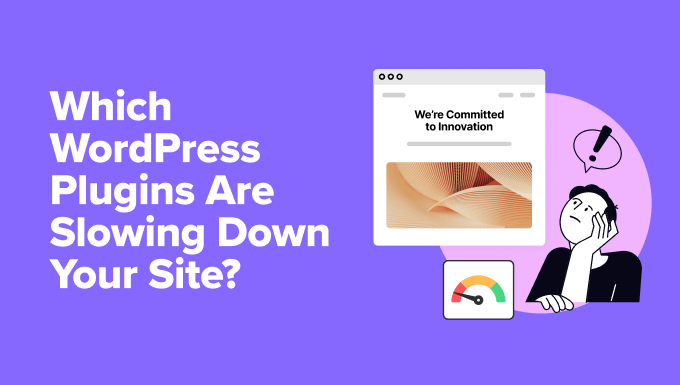
Why Do Some Plugins Sluggish Down Your WordPress Web site?
WordPress plugins are like apps in your web site. If you wish to add a brand new characteristic to your website, then you’ll most likely discover a plugin that may do it. There are tens of 1000’s of plugins accessible that allow you to add contact varieties, optimize photos, enhance search engine optimization and safety, and extra.
Now, WordPress plugins are written in the PHP programming language, similar to WordPress itself. This code runs in your server and makes use of its sources, together with reminiscence, processor, and storage.
When a customer views a web page in your web site, WordPress masses its core recordsdata and lively plugins earlier than it even masses the web page. Because of this if a plugin masses slowly, then it would have an effect on WordPress performance and decelerate your web site.
Nobody needs to attend for a sluggish web site. In accordance with one research, a delay of only one second can lower conversions by 7%, web page views by 11%, and buyer satisfaction by 16%.
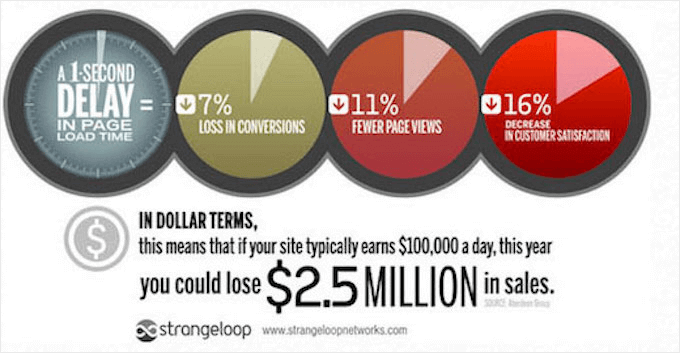
We imagine the issue isn’t the amount of plugins, however slightly the standard. You’ll be able to have dozens of good WordPress plugins operating in your web site with none points, however an addition of a single poorly coded plugin can decelerate your web site.
- Poorly written PHP code can use extreme server sources and decelerate your website.
- Some plugins question your WordPress database extra typically than crucial, straining your server’s sources and affecting its efficiency.
- Some plugins load external resources from sluggish third-party servers, rising web page load time. This may embody scripts, stylesheets, and fonts.
- Plugins which can be bloated and provide extra options than you want will take longer to load.
Discovering plugins that decelerate your WordPress web site is a vital step in optimizing its efficiency. You’ll be able to then look for alternative plugins that serve the identical objective however are optimized for higher efficiency.
Now, some crucial plugins carry out necessary duties in your server which can be resource-intensive, resembling picture optimization, checking for broken links, and malware scanning. As a substitute of deactivating these plugins, you may schedule these duties when your website has fewer guests.
And earlier than following the steps on this tutorial, be sure to update your plugins to the most recent model. Builders typically launch updates to optimize efficiency and repair bugs.
Sadly, there isn’t any easy technique to get an inventory of your slowest plugins, and you will want to do some detective work. Listed below are some methods to uncover badly behaving plugins:
Discovering Plugins That Make Sluggish Database Queries
A question monitor can uncover potential bottlenecks in your web site, together with sluggish database queries. It does this by monitoring the requests your website makes to the server.
The free Query Monitor plugin can discover potential points and supply detailed experiences that allow you to determine which plugins are slowing down your website. In actual fact, we use this plugin to boost page load speed on WPBeginner.
Step one is to put in and activate the Query Monitor plugin. Should you need assistance, then please see our newbie’s information on how to install a WordPress plugin.
As soon as activated, the plugin will add some monitoring instruments to the WordPress admin bar.
Now, you’ll want to go to the web page you wish to verify on the entrance finish of your web site. Whenever you hover your mouse over the Question Monitor instruments, a menu will seem.
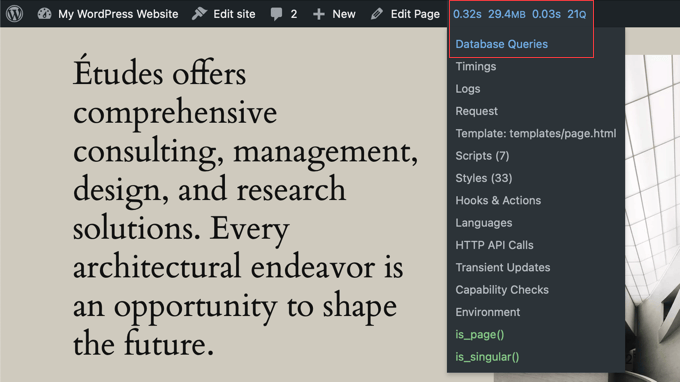
It is advisable to click on on ‘Database Queries’, and a few instruments will seem on the backside of the display.
Subsequent, click on on ‘Queries by Part’, and you will note a desk of your plugins and parts. The ‘Choose’ column exhibits you the variety of database queries carried out by every plugin, and the ‘Time’ column on this web page exhibits the overall time taken by these queries in seconds.
You’ll be able to click on on the header of both of those columns to type the checklist. For instance, clicking the Time column will type the column by time, and clicking it once more will place the slowest plugins on the prime of the checklist.
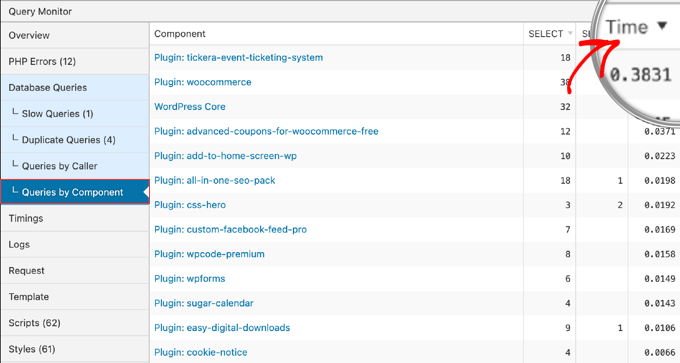
Basically, if a plugin performs greater than 20-50 queries or the queries take greater than half a second or a second, then it could be an issue. Nonetheless, these are solely pointers, and optimizing WordPress efficiency is about discovering a stability between performance and velocity.
Now you may briefly disable the sluggish plugins to see if WordPress efficiency improves utilizing the directions later on this article. If it does, then you may reach out to the plugin author for help or discover another plugin.
For extra particulars on use this plugin, see our information on how to add a WordPress query monitor on your site.
Discovering Plugins That Load Sluggish Sources
Every time somebody visits your web site, their browser must obtain the recordsdata wanted to show the online web page. These can embody photos, stylesheets, and scripts, and plugins could request a few of these recordsdata.
These could be inside recordsdata by yourself web site or exterior recordsdata from third-party web sites. Every HTTP request provides time to the loading course of.
The Community Report
You’ll be able to see how lengthy it takes to load these recordsdata by visiting a web page in your web site after which utilizing your browser’s developer instruments. In Google Chrome, merely go to View » Developer » Examine or right-click the web page and choose ‘Examine’.
Subsequent, click on the ‘Community’ tab after which reload the web page. Because the web page masses, you will note an inventory of all of the sources required to view the web page, together with inside and exterior HTTP requests.
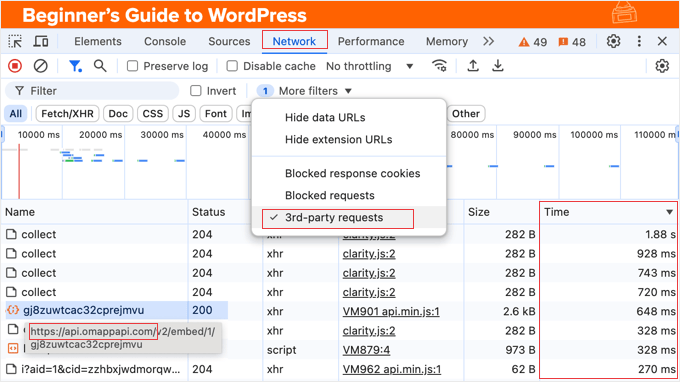
You’ll be able to view simply exterior HTTP requests utilizing the ‘Third-party requests’ filter.
The ‘Time’ column exhibits you ways lengthy it takes for every useful resource to load. You’ll be able to click on the column heading to type the checklist by time, and clicking it once more locations the slowest recordsdata on the prime.
Recordsdata that take greater than half a second or a second to load could also be a priority, though that is only a guideline.
The Initiator column could allow you to inform whether or not a plugin is loading the file, however that is typically unclear.
The Protection Report
The Protection report allows you to see which recordsdata are being loaded from a plugin’s folder in your web site. Nonetheless, it isn’t proven by default.
To show it, click on the three vertical dots within the prime proper nook and choose Extra instruments » Protection from the menu.
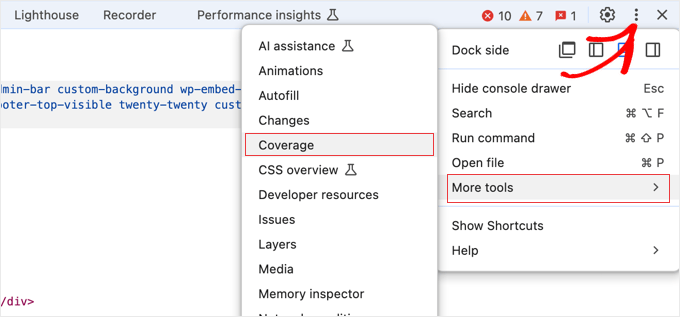
This can present you an inventory of the URLs of the sources being loaded.
To search out the recordsdata which can be being loaded out of your plugin folders, merely filter the checklist by typing /plugins/ within the URL filter subject. You must have the ability to see the title of the plugin in every URL.
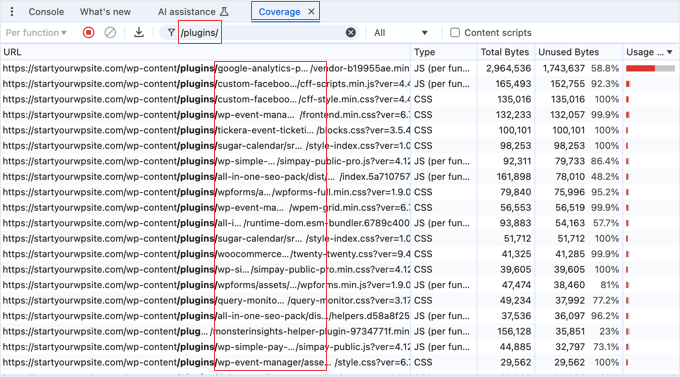
Now, you may type the checklist in numerous methods to seek out downside plugins. For instance, you may type by URL to show the entire recordsdata being loaded by every plugin collectively. Or you may type by Whole Bytes or Utilization to seek out plugins loading massive recordsdata.
For extra on this subject, see our information on how to reduce HTTP requests in WordPress.
Manually Testing the Velocity of Every WordPress Plugin
A easy and free technique to check your plugins is to deactivate them one after the other whereas checking your website’s efficiency. This methodology is free and doesn’t require putting in one other plugin in your website, however will take extra effort and time than the opposite strategies.
Begin by running a website speed test. Crucial velocity metric to trace is web page load time. In these Pingdom velocity check outcomes, it’s merely referred to as ‘Load time’.

Subsequent, deactivate the first plugin and run the velocity check once more. If the velocity improves considerably, then you could have discovered an issue plugin.
For the perfect accuracy, it is best to run every velocity check 3 occasions and common the outcomes. This can permit for web fluctuations.
After that, it is best to reactivate that plugin and deactivate the following one. Then, run one other velocity check and repeat.
An alternate methodology is to start out by deactivating all plugins after which reactivate them one after the other. You must run a velocity check with all plugins deactivated, after which after reactivating every one.
Though time-consuming, this methodology might help you determine which plugin causes a slowdown when activated.
Tip: Deactivating your plugins will take away performance out of your web site. To depart your reside website unaffected, it is best to carry out these checks on a staging site. For correct outcomes, this needs to be put in on the identical server as your reside web site.
Bonus: Enhancing Efficiency on Cell Utilizing Google Lighthouse
One other instrument you should use to enhance WordPress efficiency is Google Lighthouse. It offers useful insights into your website’s efficiency, accessibility, finest practices, and search engine optimization however doesn’t particularly determine sluggish plugins on a WordPress website.
It helps you optimize Google Core Web Vitals, that are necessary for consumer expertise and search engine optimization.
It might probably additionally present sluggish and enormous scripts and sources being loaded, which might point out plugins hurting WordPress efficiency.
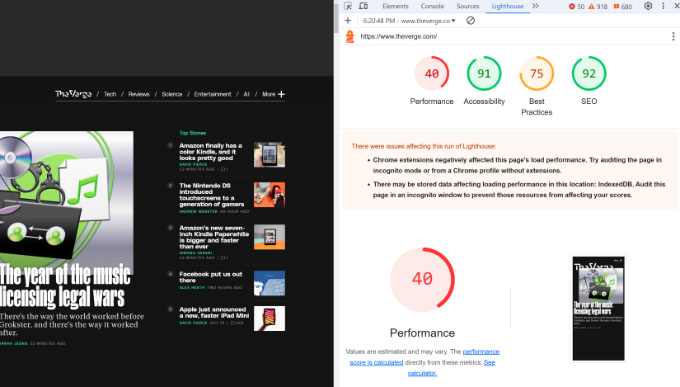
For extra particulars, see the part in our WordPress SEO Checklist on getting your WordPress website prepared for cellular.
Utilizing a Skilled Website Velocity Optimization Service
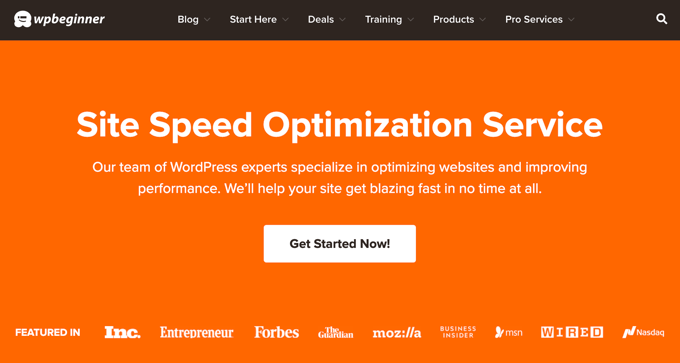
As you may see, uncovering downside plugins that could be slowing down your web site could be a variety of work, particularly if you’re not tech-savvy.
Why not use our skilled Site Speed Optimization Service as an alternative?
Our staff of specialists will arrange a staging web site in order that they’ll completely check your website with out slowing down your reside website. We’ll troubleshoot points utilizing the Google Lighthouse report.
Then, we are going to replace your plugins, overview and optimize your plugin utilization, optimize your internet server and pictures, and way more.
Pricing for our website velocity optimization service begins at simply $699. Contact our team to schedule a free session as we speak!
Selecting Higher WordPress Plugins
Should you simply found that a few of your plugins are slowing down your WordPress web site, then you could be questioning how to decide on higher ones. Let’s check out just a few issues you are able to do to be sure to discover a plugin that does all the pieces you want and is optimized for velocity.
Earlier than you get began, we suggest that you simply write an inventory of all the pieces you want the plugin to do. This will merely be an inventory of the principle options of the sluggish plugin that you’ve been utilizing. Nonetheless, that is additionally a chance to think about areas the place that plugin fell quick or presents greater than you want.
Subsequent, you can begin looking out the WordPress Plugin Listing without cost plugins that meet your wants.
Merely kind the principle characteristic within the search field on the prime of the web page and search for plugins with a variety of lively installs, robust rankings, and compatiblity with a recent version of WordPress.
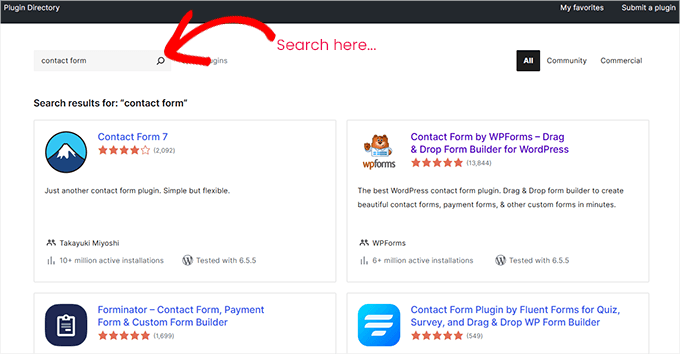
Nonetheless, with so many plugins accessible, this may be a variety of work.
It’s typically extra dependable to make use of a listing of really helpful plugins like our WordPress Solution Center. It is a curated listing of really helpful free and premium WordPress plugins that we have now completely examined and located to be probably the most dependable options.
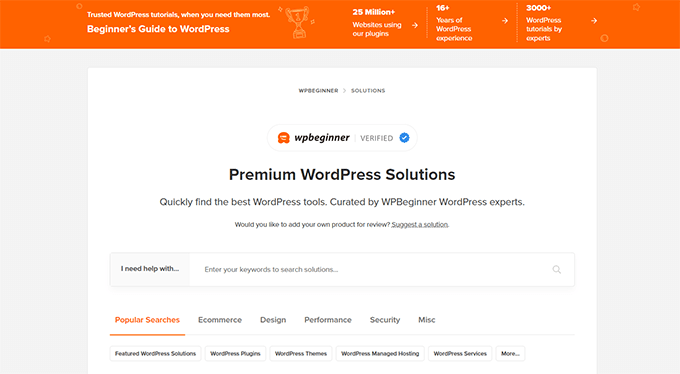
We offer detailed opinions with screenshots for every plugin, permitting you to match the professionals and cons to make sure it offers the options you want.
You too can try our Ultimate WordPress Toolkit for Pros, the place we checklist the perfect plugins in lots of classes. We use many of those plugins on WPBeginner, together with:
After getting chosen a plugin, you’ll want to check its impression in your web site’s efficiency. As we coated earlier, you may merely carry out an internet site velocity check earlier than and after putting in and activating the plugin to ensure it doesn’t sluggish your website down.
For extra on this subject, see our newbie’s information on how to choose the best WordPress plugins.
Skilled Guides Associated to WordPress Efficiency
We hope this tutorial helped you discover ways to discover which WordPress plugins are slowing down your website. You may additionally wish to see some guides on use this info to enhance WordPress efficiency:
Should you preferred this text, then please subscribe to our YouTube Channel for WordPress video tutorials. You too can discover us on Twitter and Facebook.


